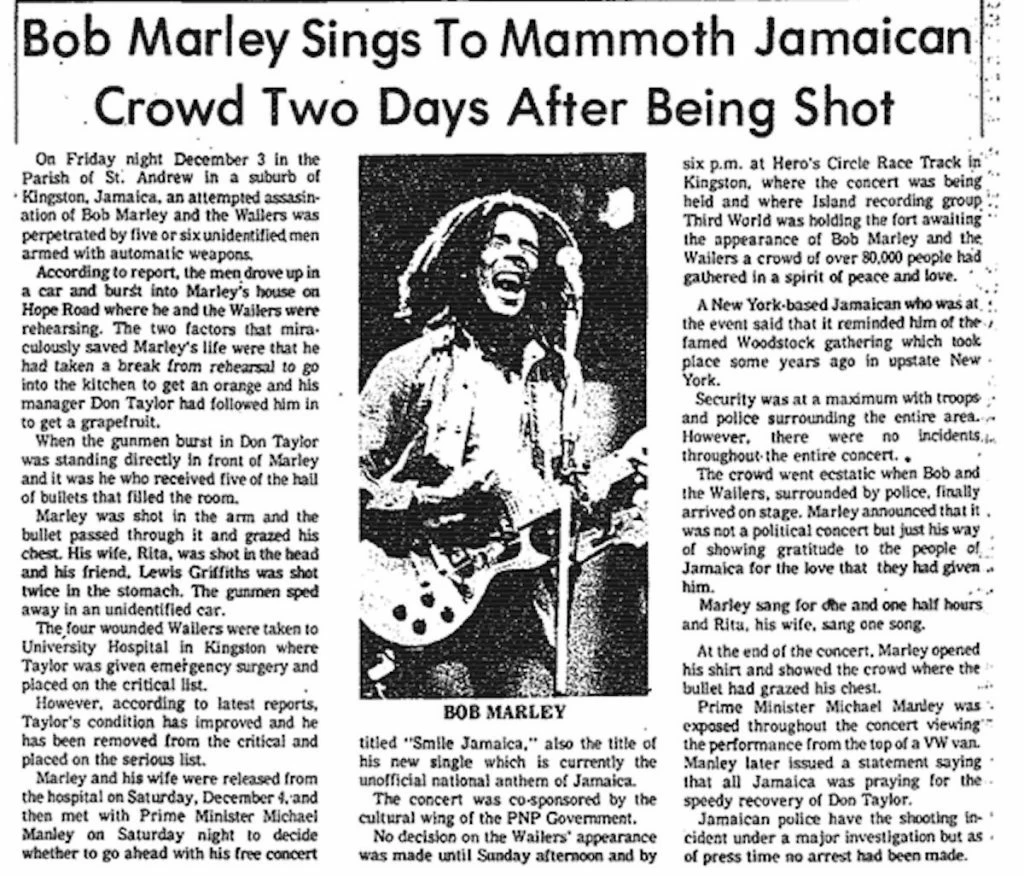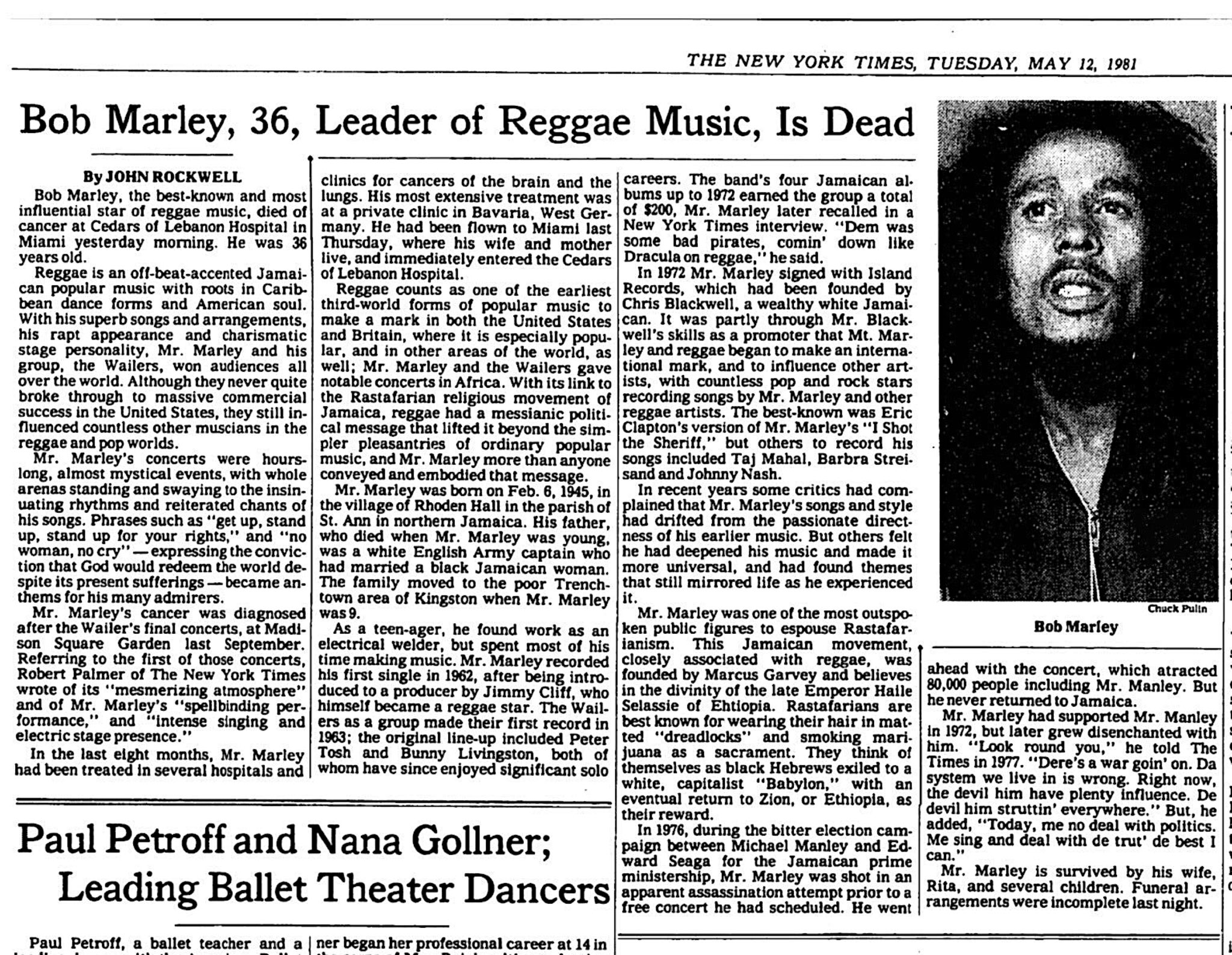Bob Marley Death Reason: The Untold Story Behind A Legend's Passing
When we talk about Bob Marley, we're not just talking about a musician—we're talking about a cultural icon, a voice for the oppressed, and a man who changed the world with his music. But behind the legacy, there's a story that many don't know: the reason behind Bob Marley's death. Today, we're diving deep into the facts, myths, and truths surrounding this legendary figure's passing. So grab your coffee, and let's uncover the real story together.
Bob Marley wasn't just another artist; he was a movement. His music wasn't just about melodies—it was about messages, about fighting for justice, and about spreading love. But like every great story, his journey had an end. And the end came too soon for many of us. In this article, we'll explore why Bob Marley passed away and what lessons we can take from his legacy.
From his early days in Jamaica to his global rise, Bob Marley's life was a rollercoaster of success, challenges, and triumphs. But even legends aren't immune to the fragility of life. In this piece, we'll shed light on the medical reasons behind his death, the controversies surrounding it, and how his legacy continues to inspire millions worldwide.
Table of Contents
- Bob Marley's Biography
- Early Life and Career
- Health Struggles: The Warning Signs
- The Medical Cause of Bob Marley's Death
- Debunking Myths About His Death
- The Lasting Legacy of Bob Marley
- How Bob Marley's Death Impacted the World
- Bob Marley's Family and Their Role
- His Music: A Reflection of His Life
- Conclusion: Lessons from Bob Marley's Death
Bob Marley's Biography
Who Was Bob Marley?
Bob Marley was more than just a reggae artist; he was a symbol of peace, love, and resistance. Born on February 6, 1945, in Nine Mile, Jamaica, Robert Nesta Marley grew up in a world filled with challenges but also with dreams. His early life was marked by struggles, but his passion for music and his unwavering belief in equality made him a global icon.
Here's a quick look at some key facts about Bob Marley:
| Full Name | Robert Nesta Marley |
|---|---|
| Birthdate | February 6, 1945 |
| Birthplace | Nine Mile, Jamaica |
| Occupation | Singer, Songwriter, Activist |
| Genre | Reggae, Ska, Rocksteady |
Early Life and Career
Bob Marley's journey began in a small village in Jamaica, where he learned the value of hard work and resilience. His early career was marked by collaborations with other artists and his eventual rise to fame with The Wailers. But fame came at a cost, and the pressures of the music industry began to take a toll on his health.
How Did His Career Shape His Life?
Music wasn't just a profession for Bob Marley; it was a calling. His lyrics spoke of freedom, unity, and hope. Songs like "No Woman, No Cry" and "One Love" became anthems for generations. But behind the scenes, the grind of touring and performing left little room for rest.
Health Struggles: The Warning Signs
Before we dive into the specifics of Bob Marley's death, it's important to understand the health struggles he faced in the years leading up to his passing. Bob Marley was diagnosed with acral lentiginous melanoma, a rare form of skin cancer, in 1977. This diagnosis was the first warning sign that something was seriously wrong.
What Were the Early Symptoms?
The cancer was initially discovered on his toe, but due to his Rastafarian beliefs, Bob Marley refused to have it amputated. Instead, he opted for alternative treatments, hoping to heal naturally. Unfortunately, the cancer spread, and by the late 1970s, it had reached other parts of his body.
The Medical Cause of Bob Marley's Death
Bob Marley passed away on May 11, 1981, in Miami, Florida. The official cause of death was complications from acral lentiginous melanoma, the same cancer that had been detected years earlier. By the time the cancer had metastasized, it was too late for conventional treatments to be effective.
Why Did the Cancer Spread?
Experts believe that the delay in treatment and the refusal to amputate the affected toe were significant factors in the cancer's progression. Additionally, the stress of constant touring and performing may have weakened his immune system, making it harder for his body to fight the disease.
Debunking Myths About His Death
Over the years, numerous myths and conspiracy theories have surfaced about Bob Marley's death. Some claim he was poisoned, while others suggest foul play. However, medical records and expert opinions confirm that his death was due to natural causes.
What Are the Most Common Myths?
- He was poisoned by enemies.
- His Rastafarian beliefs prevented all medical treatment.
- He died from a mysterious illness unrelated to cancer.
While these stories make for dramatic headlines, they lack evidence and credibility. The truth is often simpler but no less impactful.
The Lasting Legacy of Bob Marley
Even though Bob Marley's life was cut short, his legacy continues to inspire millions around the world. His music remains a testament to his beliefs and his unwavering commitment to social justice. Albums like "Exodus" and "Legend" continue to top charts and introduce new generations to his work.
How Has His Legacy Evolved?
Bob Marley's influence extends beyond music. He's become a symbol of peace and unity, with his image and quotes appearing on everything from t-shirts to murals. His family has also played a crucial role in keeping his legacy alive, with his children carrying the torch through their own music and activism.
How Bob Marley's Death Impacted the World
The loss of Bob Marley was felt worldwide. Fans and fellow musicians mourned the passing of a true icon. His death served as a reminder of the importance of health and the fragility of life, even for those who seem invincible.
What Lessons Can We Learn?
- Take care of your health, no matter how busy you are.
- Seek medical advice early when facing health issues.
- Balance work with rest to maintain overall well-being.
Bob Marley's Family and Their Role
Bob Marley's family has been instrumental in preserving his legacy. From his wife, Rita Marley, to his numerous children, they've continued his work in music, activism, and humanitarian efforts. The Marley family remains a powerful force in the music industry and beyond.
Who Are Some of His Notable Children?
Artists like Ziggy Marley, Damian Marley, and Stephen Marley have all made significant contributions to reggae and world music. Their work reflects their father's values and continues to spread his message of love and unity.
His Music: A Reflection of His Life
Bob Marley's music was more than just entertainment; it was a reflection of his life, his struggles, and his dreams. Songs like "Redemption Song" and "Buffalo Soldier" are testaments to his activism and his desire for a better world.
Which Songs Best Represent His Legacy?
- "No Woman, No Cry" – A message of comfort and hope.
- "One Love" – A call for unity and understanding.
- "Redemption Song" – A powerful anthem for freedom.
Conclusion: Lessons from Bob Marley's Death
Bob Marley's death was a tragedy, but it also serves as a powerful reminder of the importance of health, balance, and legacy. His life and music continue to inspire millions, and his message of love and unity remains as relevant today as it was during his lifetime.
So, what can we take away from this story? Take care of yourself, follow your passions, and leave a legacy that matters. Share your thoughts in the comments below, and don't forget to check out more articles on our site for stories that inspire and inform.
Thanks for reading, and let's keep the spirit of Bob Marley alive!
Peter Parker Girlfriend: The Ultimate Guide To Spider-Man's Love Life
Strahinja Jokic Height: The Inside Scoop On The Serbian Sensation
Hunger Games Cast: The Ultimate Guide To The Stars Who Brought Panem To Life

Bob Marley Death Cancer or Conspiracy? Historic Mysteries

Bob Marley Death Funeral
Bob Marley Biography, Death Cause, Age, Wife & More BioExposed